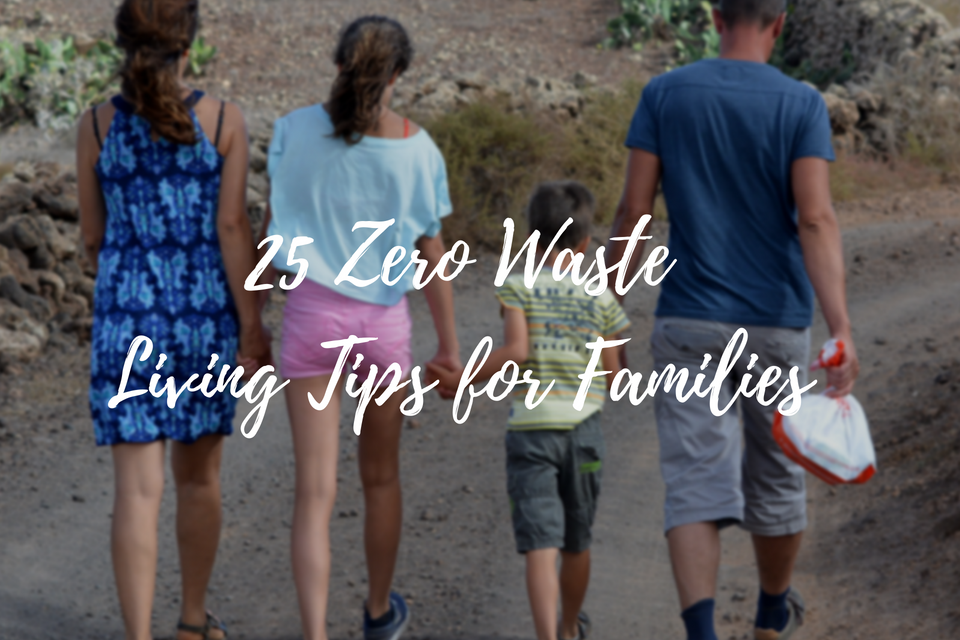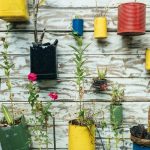
25 Zero Waste Living Tips for Families
 Becoming a zero-waste family is a lot easier than you might think it is. You don’t have to make any huge moves to start changing your lifestyle. In fact, it’s all about the little things. By making lots of small changes, you can cut down on how much waste your family products. Reduce, reuse and recycle as much as you can to create a zero-waste home. The actions themselves are super easy, but sticking to them is trickier. You need to be prepared to make a commitment if you want to make a difference. Use these 25 tips to cut back on waste and live more responsibly.
Becoming a zero-waste family is a lot easier than you might think it is. You don’t have to make any huge moves to start changing your lifestyle. In fact, it’s all about the little things. By making lots of small changes, you can cut down on how much waste your family products. Reduce, reuse and recycle as much as you can to create a zero-waste home. The actions themselves are super easy, but sticking to them is trickier. You need to be prepared to make a commitment if you want to make a difference. Use these 25 tips to cut back on waste and live more responsibly.
1/ Don’t buy water
Buying plastic bottles of water is entirely unnecessary unless you live somewhere with unsanitary water. Use reusable bottles when you go out, and keep a pitcher or filter jug refrigerated at home.
2/ Ditch paper towels
Paper towels might be convenient for cleaning or drying your hands, but you don’t need them. Use sponges and cloths for wiping and towels and dishcloths for drying instead.
3/ Eat your leftovers
Food waste is a big problem. Don’t throw away your leftovers or your cut-offs. You can have a leftover night or reuse anything from leftover chicken to vegetable odds and ends for stock.
 4/ Learn about best before dates
4/ Learn about best before dates
People throw away too much food because they think the label tells them to. Learn what you can and can’t use after the date on the label to avoid trashing something that’s still edible.
5/ Keep an arts and crafts box
Before putting cardboard and other materials into recycling boxes, consider putting them in an arts and crafts box for the kids.
6/ Repair your clothes and shoes
It’s easy to make basic repairs to your clothes with some sewing skills or even just the right tools. If you can’t do it yourself, take it to a professional.
7/ Reuse sheets and towels
Old bedding and towels can find new life as lots of things, from cleaning rags to children’s clothes. Simply rip them up or get out a sewing machine to make something new.

8/ Have house water use rules
Set clear rules on how and when to use water in your home. Include things like not running the water while brushing teeth.
9/ Take reusable bags shopping
It’s so easy to take reusable bags to the store with you. Put one in any bag that you take out with you so that you always remember to take one.
10/ Use bar soap
Bar soap tends to use less packaging than liquid soap. Instead of a plastic bottle, it comes in a wrapper that’s often made of paper.
 11/ Pick reusable baby products
11/ Pick reusable baby products
If there’s a baby in the house still in nappies, choose reusable ones instead of disposables. You can also get reusable wipes and cloths instead of going through lots of wet wipes.
12/ Use eco-friendly menstrual products
Tampons and pads produce a lot of waste. Consider trying something more eco-friendly, such as a menstrual cup or reusable cloth pads. Both can be used over and over, and last for years.
13/ Look for less packaging
Many products have too much packaging. Try to look for those that have less or even no packaging at all. Use reusable produce bags to avoid the plastic ones.
14/ Make your own home and beauty products
You can make everything from kitchen cleaner to deodorant at home, and keep your products in reusable jars and bottles. Plus, you can keep it all natural.

15/ Buy refills
Instead of buying a brand new bottle of something every time you run out, look for refill packs. They often use much less packaging, and you can reuse the original bottle.
16/ Sell or give away things you no longer need
If you don’t need something anymore, don’t just throw it. Give it to a friend, list it on eBay or find your local Facebook selling group.
17/ Take a packed lunch to work
You might give your children lunch to take to school, but you can do the same. Take a packed lunch to work to avoid buying lunch with unnecessary packaging.
18/ Turn off lights and electricals
Turn off lights when you’re not in the room, and unplug electricals that you’re not using. You can save energy and save money on your energy bills.
 19/ Choose paperless bills
19/ Choose paperless bills
You don’t need to receive your bills on paper if you’re able to see them online. The same is true for statements from your bank. Choose the paperless option to save paper.
20/ Get a reusable travel mug
Instead of buying a coffee every morning, fill up a reusable travel mug at home. Buy an insulated mug, and it will keep your drink hot. You’ll save time too.
21/ Only drive when necessary
You don’t need to drive everywhere if it’s possible to walk, take public transport or perhaps cycle. Try to cut down on how often you drive places to cut down on emissions.
22/ Drink loose leaf tea
If you’re a tea drinker, swap tea bags for loose leaf tea. You can brew it in a pot and use a strainer, or use an infuser ball for individual cups.
23/ Install LED light bulbs
Swap regular light bulbs for LEDs. They last a lot longer and use less energy, so you save on your energy bills and won’t have to change them as often.

24/ Only run your washing machine or dishwasher full
Save water and electricity by waiting until your washing machine and dishwasher are full before running them. Hunt around the house for clothes and dishes if you have to (especially if you have teenagers!).
25/ Line dry your clothes
Put your clothes out to dry on a washing line when it’s a sunny day. They’ll dry in no time, smell great from drying in the fresh air and help you save energy by not using the dryer.
There are so many small things that you can do to cut down on waste. Start becoming a zero waste family today.
